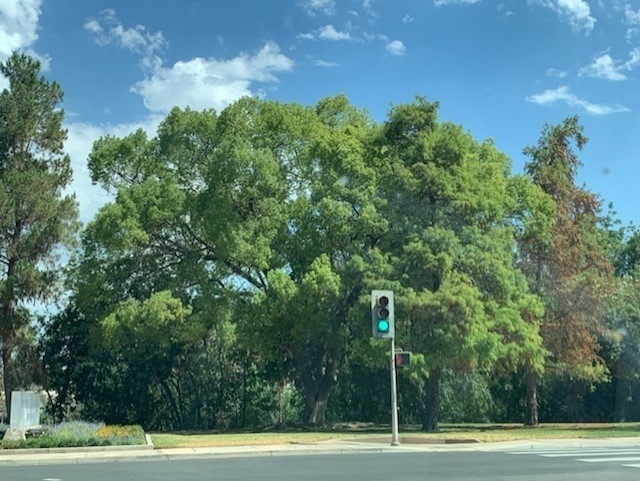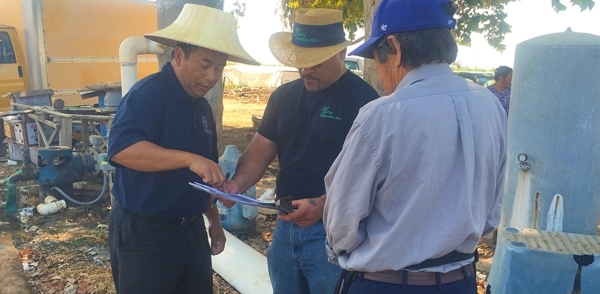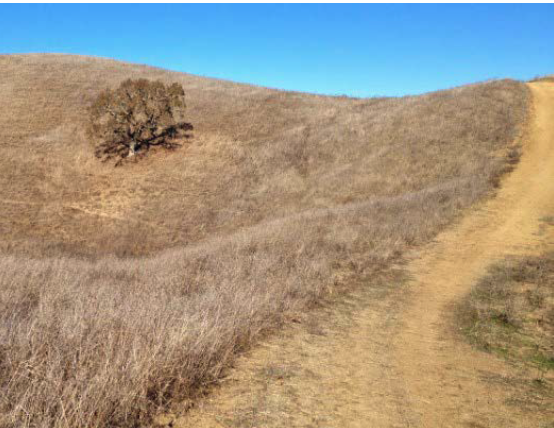Posts Tagged: DEI
Nominations for UC ANR DEI Advisory Council due Oct. 20
The UC ANR Diversity, Equity and Inclusion Advisory Council is currently seeking nominations to fill several open positions.
The DEI Advisory Council has played a crucial role in shaping the policies and initiatives that have enhanced the hiring process and addressed pay equity within UC ANR. As a council member, you will have the opportunity to collaborate with colleagues across the organization, including Employee Resource Groups, to develop recommendations for senior leadership that foster inclusivity and equity.
You may nominate yourself, a colleague or any UC ANR staff or academic member.
Membership criteria:
- Demonstrated experience and/or interest in advocating for change and advancing DEI initiatives.
- Experience or willingness to engage in efforts to drive organizational change within UC ANR.
- The council seeks to represent the diverse communities of UC ANR and California, prioritizing inclusion of individuals from underrepresented racial, ethnic, gender, sexual orientation and ability groups.
- Membership includes a balance of staff and academics from a variety of UC ANR offices and programs, with geographical representation from both northern and southern California, as well as urban and rural areas.
Before submitting a nomination, please confirm that the nominee is interested in serving on the council.
For details on member responsibilities and the council's mission and vision, visit:
DEI Advisory Council Mission Statement and Vision (https://ucanr.edu/sites/PSU/files/358281.pdf).
Submit nominations to deiadvcouncil@ucanr.edu following the attached form with the subject line: "Nomination for DEI Advisory Council."
Nomination timeline:
Deadline for nominations: Oct. 20
Application review: Oct. 21-28
Council recommendations: Oct. 29
Final recommendations to UC ANR leadership: Oct. 30-31
We look forward to receiving your nominations and continuing our collective efforts to create a more diverse, equitable and inclusive UC ANR.
For further information, please contact:
Jairo Diaz, DEI Advisory Council Chair: jdiazr@ucanr.edu
Ricardo Vela, DEI Advisory Council Chair-elect: rvela@ucanr.edu
Keith Nathaniel, DEI Advisory Council Past Chair: kcnathaniel@ucanr.edu
Elizabeth Moon, Director of Workplace Inclusion & Belonging: emoon@ucanr.edu
DEI Nomination Form[49]
Lawn-pocalypse! Surviving Drought
Ah, summer! The season of sunburns, pool parties, and… lawn droughts. If your once lush, green carpet now looks like a crunchy brown doormat, you're not alone. Let's dive into why your yard is staging a dramatic death scene and what you can do to...

Bermuda grass and weeds overtaking drought stressed turf grass.
Gardeners With Heart: Fostering Diversity, Equity, and Inclusion
Watch video on YouTube here: https://youtu.be/4W_CYgEmNF8
As we bring National Volunteer Month to a close, we are honored to highlight a group of outstanding UC Master Gardener volunteers who have been nominated for their work in promoting diversity, equity, and inclusion (DEI) within their communities. These UC Master Gardeners have demonstrated a dedication to creating a more inclusive environment in gardening and volunteerism. Join us as we celebrate these inspiring Gardeners with Heart for their invaluable contributions to fostering diversity and equity in gardening and beyond.
Kathy Kaplan, a UC Master Gardener of Santa Clara County, embodies the spirit of inclusivity and effective volunteer leadership. She cultivates a welcoming and inclusive atmosphere, ensuring everyone feels heard and valued. Kathy created and helps run “The One World Kitchen Garden” at the Martial Cottle Park Demonstration Garden. The “One World Kitchen Garden” demonstrates growing edible plants embraced by the many cultures represented across Santa Clara County, showcasing the rich diversity in our local communities. To promote inclusion in the program, Kathy intentionally plans two weekly demo garden workdays, one during the week and one on weekends, to accommodate MGs with different employment statuses and schedules.
Linda Mansell, Julie Avis, Guma, Kim Jacobs, and Rudolfo Milito form a dynamic team within the UC Master Gardener Program of Sonoma County that supports its DEI efforts. This team's extensive work translating resources into Spanish has expanded access to gardening knowledge and resources for Spanish-speaking communities across California. Each month, the team translates its gardening advice column in the Press Democrat for use in the Spanish column, La Prensa, offering seasonally relevant advice on sustainable gardening and increasing awareness of the program and resources throughout Sonoma County. The county's Spanish website features links to videos they have produced in Spanish on multiple gardening topics. The team translated video scripts from English and reviewed them for cultural appropriateness. The team volunteers at events in the Latino community, distributes documents in Spanish, and answers questions. All of the UC Master Gardener projects in Sonoma County and across California benefit from the contributions of the Spanish translation team!
Debbie Spurling, a UC Master Gardener of Sutter-Yuba, has demonstrated dedication to promoting diversity and inclusion within her local program. As project leader for the UC Master Gardener training program, Debbie worked alongside several counties to determine best practices for volunteer recruitment. She ensured those elements were used in the volunteer advertising and interviewing process. Debbie also spearheaded a new mentorship program in the county to improve retention of new volunteers. This program was inspired by her own class graduating and experiencing a feeling of not being included in the larger population. She vowed that this would not be something other trainees would feel moving forward. At every step of developing and running the mentorship program, Debbie has worked to ensure that decisions were made through the diversity and inclusion lens, including in choosing a diverse selection of speakers. The mentorship program has gotten rave reviews from new UC Master Gardeners who say they have felt more included and welcomed.
We are immensely grateful for the dedication, passion, and hard work that Kathy Kaplan, Linda Mansell, Julie Avis, Guma, Kim Jacobs, Rudolfo Milito, and Debbie Spurling have demonstrated in promoting diversity, equity, and inclusion within the UC Master Gardener community. Their collective efforts have enriched the lives of individuals and families, fostering a more inclusive and equitable environment for all. As we celebrate National Volunteer Month, let us extend our heartfelt appreciation to these Gardeners with Heart for their invaluable service and commitment to creating a more diverse and inclusive world.
About National Volunteer Month and Gardeners with Heart
During National Volunteer Month (April 1 - 30), the UC Master Gardener Program celebrates its incredible volunteers and their contributions to California communities. Gardeners with Heart were identified by local county leadership as diversity, equity, and inclusion leaders because of their commitment to building connections with community-based organizations and underrepresented communities. Join us in honoring their dedication and passion for making a difference in the lives of others. If you would like to get involved and learn more about gardening in your community, you can find your local program here.

MG with heart color logo blue gloves gold trim
Climate-Change Resources
University of California UC ANR Green Blog (Climate Change and Other Topics) https://ucanr.edu/blogs/Green/index.cfm?tagname=climate%20change (full index)
Examples:
- Save Trees First: Tips to Keep Them Alive Under Drought https://ucanr.edu/b/~CdD
- Landscaping with Fire Exposure in Mind: https://ucanr.edu/b/~G4D
- Cities in California Inland Areas Must Make Street Tree Changes to adapt to Future Climate https://ucanr.edu/b/~oF7
Drought, Climate Change and California Water Management Ted Grantham, UC Cooperative Extension specialist (23 minutes) https://youtu.be/dlimj75Wn9Q
Climate Variability and Change: Trends and Impacts on CA Agriculture Tapan Pathak, UC Cooperative Extension specialist (24 minutes) https://youtu.be/bIHI0yqqQJc
California Institute for Water Resources (links to blogs, talks, podcasts, water experts, etc.) https://ciwr.ucanr.edu/California_Drought_Expertise/
UC ANR Wildfire Resources (publications, videos, etc.) https://ucanr.edu/News/For_the_media/Press_kits/Wildfire/ (main website)
-UC ANR Fire Resources and Information https://ucanr.edu/sites/fire/ (main website)
-Preparing Home Landscaping https://ucanr.edu/sites/fire/Prepare/Landscaping/
UC ANR Free Publications https://anrcatalog.ucanr.edu/ (main website)
- Benefits of Plants to Humans and Urban Ecosystems: https://anrcatalog.ucanr.edu/pdf/8726.pdf
-Keeping Plants Alive Under Drought and Water Restrictions (English version) https://anrcatalog.ucanr.edu/pdf/8553.pdf
(Spanish version) https://anrcatalog.ucanr.edu/pdf/8628.pdf
- Use of Graywater in Urban Landscapes https://anrcatalog.ucanr.edu/pdf/8536.pdf
- Sustainable Landscaping in California https://anrcatalog.ucanr.edu/pdf/8504.pdf
Other (Non-UC) Climate Change Resources
Urban Forests and Climate Change. Urban forests play an important role in climate change mitigation and adaptation. Active stewardship of a community's forestry assets can strengthen local resilience to climate change while creating more sustainable and desirable places to live. https://www.fs.usda.gov/ccrc/topics/urban-forests
Examining the Viability of Planting Trees to Mitigate Climate Change (plausible at the forest level) https://climate.nasa.gov/news/2927/examining-the-viability-of-planting-trees-to-help-mitigate-climate-change/
Reports and other information resources coordinated under the auspices of the United Nations and produced through the collaboration of thousands of international scientists to provide a clear and up to date view of the current state of scientific knowledge relevant to climate change. United Nations Climate Action
Scientific reports, programs, action movements and events related to climate change. National Center for Atmospheric Research (National Science Foundation)
Find useful reports, program information and other documents resulting from federally funded research and development into the behavior of the atmosphere and related physical, biological and social systems. Search and find climate data from prehistory through to an hour ago in the world's largest climate data archive. (Formerly the "Climatic Data Center") National Centers for Environmental Information (NOAA)
Think tank providing information, analysis, policy and solution development for addressing climate change and energy issues (formerly known as the: "Pew Center on Global Climate Change"). Center for Climate & Energy Solutions (C2ES)
Mapping Resilience: A Blueprint for Thriving in the Face of Climate Disaster. The Climate Adaptation Knowledge Exchange (CAKE) was launched in July 2010 and is managed by EcoAdapt, a non-profit with a singular mission: to create a robust future in the face of climate change by bringing together diverse players to reshape planning and management in response to rapid climate change. https://www.cakex.org/documents/mapping-resilience-blueprint-thriving-face-climate-disaster
Cal-Adapt provides a way to explore peer-reviewed data that portrays how climate change might affect California at the state and local level. We make this data available through downloads, visualizations, and the Cal-Adapt API for your research, outreach, and adaptation planning needs. Cal-Adapt is a collaboration between state agency funding programs, university and private sector researchers https://cal-adapt.org/
Find reports, maps, data and other resources produced through a confederation of the research arms of 13 Federal departments and agencies that carry out research and develop and maintain capabilities that support the Nation's response to global change. Global Change (U.S. Global Change Research Program)
The Pacific Institute is a global water think tank that combines science-based thought leadership with active outreach to influence local, national, and international efforts to develop sustainable water policies. https://pacinst.org/our-approach/
Making equity real in climate adaptation and community resilience policies and programs: a guidebook. https://greenlining.org/publications/2019/making-equity-real-in-climate-adaption-and-community-resilience-policies-and-programs-a-guidebook/
Quarterly CA Climate Updates and CA Drought Monitor Maps (updated each Thursday) https://www.drought.gov/documents/quarterly-climate-impacts-and-outlook-western-region-june-2022
Drought focus of Water Resources IMPACT magazine special issue
UC ANR experts address emotional toll of drought
Preparing the American West for prolonged drought is the focus of a double issue of Water Resources IMPACT magazine. The California Water Commission staff are guest editors for this special open-access edition of the magazine, which is published by the American Water Resources Association.
Faith Kearns, academic coordinator of University of California Agriculture and Natural Resources' California Institute for Water Resources, is among the authors delving into how drought impacts people and the environment and how we can better prepare for the inevitable.
The first issue, published on Feb. 14, focuses on water scarcity issues confronting California and the ways these issues affect different sectors.
In “Trauma, Care, and Solidarity: Addressing the Emotional Toll of Chronic Drought,” Kearns highlights the effects of drought on mental health. She points to the spike in suicide hotline calls when wells ran dry in Southeast Asian communities in California's Central Valley.
By listening to Southeast Asian farmers, Ruth Dahlquist-Willard and Michael Yang of UC Cooperative Extension were able to “lighten the load” for them by providing pragmatic support, Kearns writes.
“The scale of some of these highly emotional issues – drought, wildfires, climate change – can make them seem incredibly difficult, if not impossible, to deal with,” Kearns said. “At the same time, they are affecting everyone living in the western U.S. on a daily basis. I wanted to highlight and provide models based on work that people – whether they are researchers, clinical psychologists, or Cooperative Extension advisors – are doing right now to ease the way.”
The authors who contributed to the double issue are a diverse array of Tribal experts, academics, nongovernmental organization thought-leaders, water managers and water policy influencers, each of whom brings their own perspective on the topic of drought. Their expertise and perspectives in climate science, water policy and water management will help inform drought-related decision-making and support policies that better prepare the state to thrive during periods of prolonged water scarcity.
In addition to Kearns, the first issue includes articles contributed by:
- Samantha Stevenson, University of California, Santa Barbara
- Jay Lund, University of California, Davis
- Ron Goode, North Fork Mono Tribe
- Andy Fecko, Placer County Water Agency
- Jeff Mount, Public Policy Institute of California, and Ted Grantham, University of California, Berkeley/UC Cooperative Extension
- Nat Seavy and Karyn Stockdale, National Audubon Society
- Kjia Rivers, Community Water Center
- Cannon Michael, Bowles Farming
- Michelle Reimers, Turlock Irrigation District
The January/February edition of Water Resources IMPACT magazine can be accessed, free of charge, on the American Water Resources Association website at https://www.awra.org under “Publications.”
The second issue, to be published in March, will focus on drought response, considering the options for adaptation. This two-part series complements the Commission's work on strategies to protect communities and fish and wildlife in the event of a long-term drought.



